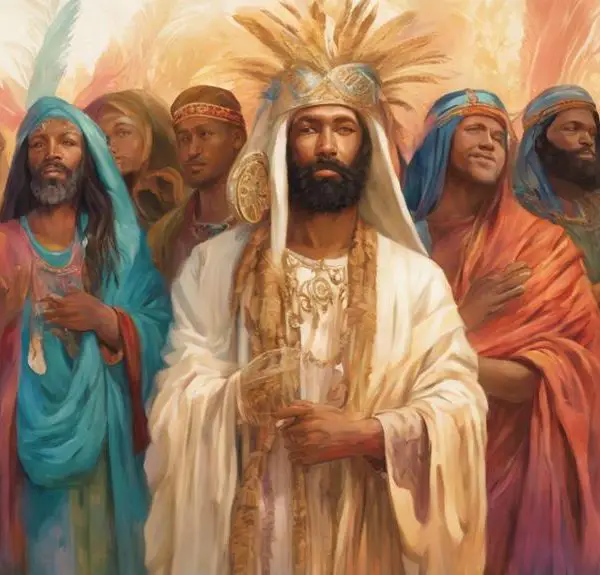These biblical figures who defied God offer timeless lessons on faith, mistakes, and redemption, inviting us to delve deeper into their stories.

Who in the Bible Disobeyed God
From Adam and Eve's initial indiscretion to Peter's poignant denial, the Bible brims with stories of those who've defied the divine. You've likely heard these tales, but have you ever pondered the profound lessons they embody?
Each narrative offers more than a mere recounting of rebellion; they serve as solemn warnings and sources of wisdom, urging you to reflect on the complexities of faith, obedience, and forgiveness.
As we explore these acts of defiance, you might find yourself surprised by the relevance and insights they hold for your own life journey. Why not uncover what these stories can teach us about navigating our flaws and the path to redemption?
Key Takeaways
- Adam and Eve's disobedience in the Garden of Eden introduces the concept of original sin.
- Cain's murder of Abel exemplifies how jealousy can lead to defiance against God's commandments.
- Jonah's flight from God's mission highlights the struggle with divine commands and personal desires.
- King David's affair with Bathsheba shows leadership's vulnerability to moral failure and the importance of repentance.
Adam and Eve's Fall

In analyzing the biblical narrative of Adam and Eve's fall, it's crucial to note that their act of disobedience marks a foundational moment in understanding human nature and moral responsibility. This event introduces the concept of original sin, a fundamental tenet that has shaped theological discourse for centuries. Through the temptation narrative, you're presented with a complex interplay of free will, temptation, and the consequences of one's actions.
The story unfolds in the Garden of Eden, where Adam and Eve live in harmony until they're tempted by the serpent. This moment is pivotal; it embodies the first instance of human beings making a choice contrary to divine command. The act of eating the forbidden fruit, thus, isn't just a literal transgression but symbolizes the broader human propensity to succumb to temptation, leading to the fall from grace.
This narrative serves as a critical lens through which you can explore themes of innocence, culpability, and redemption. It's not merely about the act itself but its ramifications for humanity. The concept of original sin derived from this episode emphasizes the inherited nature of moral imperfection, framing the human condition in a context of striving for moral integrity despite inherent flaws.
Cain's Jealous Rage
Following the narrative of original sin, the story of Cain's jealous rage offers a profound exploration of sibling rivalry and the darker aspects of human nature. This biblical account delves into the complexities of human emotions when Cain, the firstborn of Adam and Eve, reacts with lethal jealousy towards his brother Abel. The root of this discord sprouts from their sacrificial offerings to God. Abel's offering, a lamb from his flock, finds favor with God, while Cain's offering, produce from the ground, does not.
This differential acceptance exacerbates the already existing tension of sibling rivalry, highlighting a pivotal theme in human relationships. Cain's response to God's rejection of his sacrifice isn't to improve his offerings or seek divine guidance but to eliminate the competition—his brother Abel. This act of violence marks a critical point in the biblical narrative, illustrating how jealousy can lead to the ultimate disobedience against God's commandment to love and protect one's kin.
Cain's story serves as an early testament to the destructive potential of unchecked emotions and the consequences of allowing envy and rivalry to dictate actions. Through this narrative, the Bible underscores the importance of mastering one's darker impulses and the value of fraternal harmony over competition.
Jonah's Flight

Jonah's deliberate attempt to evade his divine mission encapsulates another form of disobedience, showcasing a profound struggle between divine decree and personal desire. This narrative, laden with prophetic reluctance, unveils a pivotal moment where human will clashes with God's command. Jonah's nautical escape, boarding a ship to Tarshish, marks a significant deviation from the obedience traditionally expected of prophets. This act of defiance isn't merely physical but symbolizes a deeper spiritual rebellion against the task set before him.
Analyzing Jonah's flight, one discerns a multifaceted disobedience. It isn't solely the act of running away; it's the underlying reluctance to fulfill a prophetic duty, a resistance to engage with Nineveh's populace due to personal prejudices and fears. This narrative thread underscores the complexity of disobedience, revealing it as not just a singular act but a series of decisions propelled by a mixture of motives.
Jonah's story, punctuated by his nautical escape, serves as a profound study on the consequences of ignoring divine mandates. It illustrates the inevitable confrontation with the divine that follows such resistance, emphasizing the futility of trying to outrun divine purpose. Through Jonah's ordeal, the text explores the themes of repentance and redemption, highlighting the transformative power of obedience.
David's Transgression
Shifting focus to another biblical narrative, David's transgression emerges as a seminal episode of disobedience, illustrating the complexities of moral failure and divine judgment within a leadership context. David, a man after God's own heart, fell into a grave sin involving Bathsheba, demonstrating that no one is beyond the reach of temptation and the consequences of disobedience.
Key points to consider in David's story include:
- Bathsheba's Involvement: David's sin wasn't solitary but involved the exploitation of Bathsheba, highlighting the communal impact of personal sins.
- Immediate Consequences: David's actions led to immediate and severe consequences, affecting his family and reign.
- Repentance Process: David's genuine repentance is a critical component of the narrative, showcasing the possibility of redemption and forgiveness.
- Divine Judgment: Despite David's repentance, he faced divine judgment, emphasizing that forgiveness doesn't always remove temporal consequences.
- Legacy Impact: David's transgression had lasting effects on his legacy, reminding leaders of the enduring impact of their moral choices.
Analyzing David's transgression reveals the profound lessons on repentance, forgiveness, and the serious consequences of disobedience.
Peter's Denial

How does Peter's denial of Jesus, amidst the fear and uncertainty of Christ's final hours, offer insights into human frailty and the capacity for redemption? This poignant episode illuminates the complexity of human nature, where faith tested by dire circumstances can falter. Peter, one of Jesus's most devoted followers, faced the ultimate test of loyalty. Despite his initial fervent claims of steadfastness, the impending danger led to his denial of Christ not once, but thrice before the rooster's crow signaled the fulfillment of Jesus's prophecy.
This narrative isn't merely a recount of failure but a profound exploration of fear, weakness, and the subsequent journey towards forgiveness and understanding. The rooster's crow, marking Peter's realization of his betrayal, serves as a pivotal moment of self-awareness and repentance. It underscores the fragility of human resolve in the face of existential threats but also highlights the boundless capacity for forgiveness and personal growth.
In essence, Peter's denial and the symbolic rooster's crow encapsulate the inherent conflict between human frailty and the aspiration for redemption. It reminds us that the path to spiritual enlightenment and strength is often paved with moments of doubt and failure, yet it's through acknowledging and overcoming these trials that true faith is forged.
Frequently Asked Questions
How Did the Disobedience of Individuals in the Bible Impact the Course of Human History?
When individuals in historical texts like the Bible acted against directives, it wasn't just a personal moment of rebellion; these acts had global implications, shaping the course of human history.
Your actions, mirroring this pattern, can lead to personal transformation and, potentially, broader societal shifts. This interplay between individual choices and their larger impact highlights the profound connection between personal ethics and the collective human experience.
Are There Examples of God Forgiving Those Who Disobeyed Him in the Bible, Outside the Commonly Mentioned Stories?
Absolutely, the Bible is bursting at the seams with tales where divine forgiveness eclipses human folly. Delving beyond surface-level narratives, one uncovers a rich tapestry of forgiveness mechanisms, showcasing the monumental importance of repentance.
Such stories aren't merely historical footnotes but are deeply analytical, offering a scholarly and objective lens on the transformative power of forgiveness. They serve as profound reminders that no misstep is too great for the possibility of redemption.
How Do Different Denominations Interpret the Consequences of Disobedience Depicted in the Bible?
You'll find that denominational interpretations of the consequences of disobedience in the Bible vary widely. Some view these consequences as literal and immediate, while others see them as more symbolic, focusing on spiritual or long-term effects.
This consequence diversity reflects broader theological perspectives within Christianity. By examining these interpretations, you can gain insights into how different denominations understand the nature of sin, forgiveness, and divine justice.
In What Ways Does the Concept of Disobedience in the Bible Reflect on Contemporary Moral and Ethical Issues?
Imagine the Bible's tales of disobedience as a mirror, reflecting modern moral dilemmas back at us.
This ancient text underlines the timeless struggle with ethical relativism, where what's right seems to shift like sand under our feet.
Today, these stories prompt you to question where modern accountability lies in an era of changing norms.
They push you to analyze how contemporary issues align with or diverge from these age-old lessons on disobedience.
Can the Acts of Disobedience in the Bible Be Seen as a Form of Protest or Questioning Authority, and How Is This Perspective Addressed in Theological Discussions?
You're exploring whether acts of disobedience in sacred texts can be viewed as protest or questioning of authority, delving into the symbolism of protest and the dynamics of authority in theological discussions.
This perspective offers a nuanced understanding of biblical narratives, encouraging you to think critically about the interplay between divine commandments and human agency.
It's an analytical approach that examines how these acts are framed within scholarly debates on morality and obedience.
Conclusion
In conclusion, from Adam and Eve's inaugural defiance to Peter's poignant denial, the biblical narrative is rife with individuals who disobeyed God. These stories serve not merely as cautionary tales but as profound reflections on the human condition.
It's as if each act of disobedience, from the smallest lie to the most egregious betrayal, weaves into the tapestry of history a reminder of our fallibility. In a sea of transgressions, these accounts stand as lighthouses, guiding humanity back to moral rectitude.



Sign up